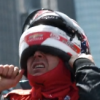I don't think it necessarily deserves a thead, but to me I think lifting the ban on FRIC is a possible solution to porpoising.

Porpoising and possible solutions
#1

Posted 24 February 2022 - 20:31
Advertisement
#2

Posted 24 February 2022 - 20:39
People were saying a while ago that the team that gets it right on the new regulation changes would triumph. Maybe it's just that the teams that haven't gotten it right will suffer. Perhaps they should just do nothing about it.
#3

Posted 24 February 2022 - 20:43
#4

Posted 24 February 2022 - 20:53
Possible solutions
The renault old trick, the mass damper!
#5

Posted 24 February 2022 - 20:54
#6

Posted 24 February 2022 - 20:55
#7

Posted 24 February 2022 - 20:58
Didn't someone high up in an F1 team say that they could avoid it by running the cars higher?
Solution found.
#8

Posted 24 February 2022 - 20:58
I don't see it as a "problem", quite the opposite! It's a new challenge for engineers to solve, and that is exactly what F1 should be about.
Totally totally agree.
If they run in the wet too low they aquaplane
If they run with too much camber they eat tyres
If they run without sufficient cooling they overheat
This is just another balancing exercise
#9

Posted 24 February 2022 - 21:12
Absolutely!
If you have a problem, increase ride height. If a team manages to keep porpoising under control without sacrificing performance, then they should be rewarded, not penalised!
#10

Posted 24 February 2022 - 21:14
Ask Boeing for some code, be up and running in no time.
#11

Posted 24 February 2022 - 21:15
Didn't someone high up in an F1 team say that they could avoid it by running the cars higher?
Solution found.
Stiffer suspension works too. Both solutions come with a price tag in lap time.
#12

Posted 24 February 2022 - 21:16
If F1 is going to take an active part in solving this, then it will result in a rule changes of sort which inevitably effects some teams more than others and/or could lead to design changes that are more difficult under the cost cap. ♪ Controversy! ♫
Indycar does rely a lot on the floor for downforce, but there are big differences that allow the series to avoid issues like this. They have a spec chassis with spec aero pieces, which the governing body can develop and test on track then modify before teams run it in practice or race. They also made a big aero change a couple years back and cut the overall downforce by a huge amount, which means they may not being reach the amount of downforce needed to cause separation
#13

Posted 24 February 2022 - 21:30
I wonder how many of F1's current aerodynamicists were already around the paddock in 1982? Can't be that many with hands on experience of solving the problems that come with ground effect chassis.
The teams will just have to sort it out. They managed to keep things under control forty years ago with nothing but tufts of wool and smoke generators on a 1/4 scale car. They'll get on top if it now.
#14

Posted 24 February 2022 - 21:35
Instead of an aero formula, the new rules turn out to be a suspension formula.
Who’d have thought so...
#15

Posted 24 February 2022 - 21:35
Didn't someone high up in an F1 team say that they could avoid it by running the cars higher?
Solution found.
Run the car higher. Run the car softer too. That way the suspension absorbs the bumps quicker and the oscillation doesn't get transferred to the whole car. Makes the ground effect less effective but stops the porpoising.
#16

Posted 24 February 2022 - 21:56
Running higher or softer will just be a quick fix. This is going to be an aggressive area of development. Team who comes up with the smartest solution will have a clear advantage. Probably more to gain here initially than with aero updates.
#17

Posted 24 February 2022 - 21:59
IIRC, McLaren had a problem with this in 2013 - which they sorted out.
#18

Posted 24 February 2022 - 22:12
A rare occasion that F1.com has an interesting article. On porpoise?: https://www.formula1...1L9LfSutcS.html
#19

Posted 24 February 2022 - 22:15
Run the car higher. Run the car softer too. That way the suspension absorbs the bumps quicker and the oscillation doesn't get transferred to the whole car. Makes the ground effect less effective but stops the porpoising.
It's not just from bumps though. Above a certain speed the floor generates enough downforce to pull the car deep enough into the suspension travel that the airflow into the diffuser is choked and the floor loses downforce. The car then goes up, is able to generate enough downforce again and goes back down. And so on. For that issue the teams actually need stiffer suspension, or at least progressively stiffer near the end of the travel.
Advertisement
#20

Posted 24 February 2022 - 22:17
The renault old trick, the mass damper!
this is on the haas?

Edited by vlado, 24 February 2022 - 22:17.
#21

Posted 24 February 2022 - 22:17
Teams have been using FRIC snce the 1970's.
https://www.formula1...-explained.html
It's main purpose is to lower the cars ride height and produce more downforce. Thus, the solution is pretty obvious without adding more weight and expenses. Raise the ride height and use stiffer springs.
#23

Posted 24 February 2022 - 22:29
A rare occasion that F1.com has an interesting article. On porpoise?: https://www.formula1...1L9LfSutcS.html
Let me get your coat, sir.
#24

Posted 24 February 2022 - 22:31
Interesting that those who switched the pull/push rod configurations, McLaren and Red Bull, seem to have the least problem with porpoising…
#25

Posted 24 February 2022 - 22:37
A rare occasion that F1.com has an interesting article. On porpoise?: https://www.formula1...1L9LfSutcS.html
On porpoise. ![]()
#26

Posted 24 February 2022 - 22:59
Running higher or softer will just be a quick fix. This is going to be an aggressive area of development. Team who comes up with the smartest solution will have a clear advantage. Probably more to gain here initially than with aero updates.
Good, as prototype racing at the highest level should be.
#27

Posted 24 February 2022 - 23:54
IIRC, McLaren had a problem with this in 2013 - which they sorted out.
Was that the one they just ran as stiff as a board?
#28

Posted 25 February 2022 - 00:03
It's not just from bumps though. Above a certain speed the floor generates enough downforce to pull the car deep enough into the suspension travel that the airflow into the diffuser is choked and the floor loses downforce. The car then goes up, is able to generate enough downforce again and goes back down. And so on. For that issue the teams actually need stiffer suspension, or at least progressively stiffer near the end of the travel.
But it’s caused by the bumps, which create the initial disturbance. Above the critical speed the aero and suspension being to work in a sort of resonance and the effect increases.
#29

Posted 25 February 2022 - 00:42
But it’s caused by the bumps, which create the initial disturbance. Above the critical speed the aero and suspension being to work in a sort of resonance and the effect increases.
It is correlated to speed and doesn't happen if they stay below a certain speed. Amus article said Haas couldn't run over 250 km/h on their filming day because of this. This phenomenon is new to me, but in following the discussion at F1technical and comments from the The Race and others I haven't seen any mention of bumps yet. I have heard discussion of stiffening the suspension though
The Race made their own explainer video here, and beginning at 3:55 they point out that the cars are damaging the track from bottoming out but only in the last part of the main straight where they are at top speed
A lot of the aero tricks in recent years have been about getting downforce to stall above a certain speed which they would presumably only hit on the straights, and by stalling downforce they also reduce drag. That is similar to what they are accidently triggering here, but with the floor this low and the aero so floor dependent it is creating this effect now.
Edited by boomn, 25 February 2022 - 00:42.
#30

Posted 25 February 2022 - 01:19
As down force increases;
the front wing going down;
that initiate the chocking of the air flow towards the tunnel;
it stalls the tunnel;
downforce weakens therefore car lifts up;
then the air comes in;
downforce increases,…
So you rise the front wing high enough it will not;
When the ride hight does not change in the straight it will not;
But, it seems there are three sort of streams in the tunnel that could make more influences towards the rear half, as there is no skirt.
Good to hear, some sorted out the issue in advance.
Edited by kumo7, 25 February 2022 - 01:21.
#31

Posted 25 February 2022 - 01:47
#32

Posted 25 February 2022 - 01:53
Add a tiny shopping cart wheel in the middle of the car's floor?
#33

Posted 25 February 2022 - 02:32
A rare occasion that F1.com has an interesting article. On porpoise?: https://www.formula1...1L9LfSutcS.html
Based on that video, Mark's got it all wrong: the rear springs are too soft, causing the rear to lower more than the front, and in turn, decreasing the angle of attack. Downforce is lost, allowing the rear spring to push back up, increasing the angle of attack, which increases downforce. Rinse, Repeat.
Of course, I'm not an aerodynamicist, so what the hell do I know.
#34

Posted 25 February 2022 - 02:35
...
Indycar does rely a lot on the floor for downforce, but there are big differences that allow the series to avoid issues like this. They have a spec chassis with spec aero pieces, which the governing body can develop and test on track then modify before teams run it in practice or race. ...
But Indycar hasn't always had spec chasis,. On top of that, I don't remember porpoising being a problem for Lola, Reynard, Eagle, Swift, G-Force, Dallara, or Panoz.
#35

Posted 25 February 2022 - 02:55
Couldn't you just add suspension blocks so that the suspension bottoms out before the bottom of the car does?
I was thinking about it. It could not be a ‘movable’ aero device, right???
By all means, perhaps, it is not that easy I am assuming.
#36

Posted 25 February 2022 - 03:11
But Indycar hasn't always had spec chasis,. On top of that, I don't remember porpoising being a problem for Lola, Reynard, Eagle, Swift, G-Force, Dallara, or Panoz.
I don’t know the older Indycar history and how their aero compared, but the big changes I was referring to happened only recently in 2018 with the new spec aero kit. With the spec aerokit they moved to make a much higher percentage of downforce through the floor but they also drastically cut the total downforce amount. To do that, they spent 2 years designing and then, importantly, track testing it
#37

Posted 25 February 2022 - 03:42
this is on the haas?
That just looks like a 3rd spring, but it looks like its sitting in the T tray area?
#38

Posted 25 February 2022 - 04:34
What this tells me is that current simulators are not that complete, one of tools that simulators should have is the reaction of the car to dynamic forces including aero forces.
Edited by AlexS, 25 February 2022 - 04:36.
#39

Posted 25 February 2022 - 06:36
What this tells me is that current simulators are not that complete, one of tools that simulators should have is the reaction of the car to dynamic forces including aero forces.
As pointed out above a couple of times, with a link, The Race has a nice but on their YouTube channel. In this video they also explain why the teams can't really test for these kinds of gremlins.
Advertisement
#40

Posted 25 February 2022 - 06:59
Using simple bump stops would probably fix it as that was a solution in the early day ground effect F1, but i do think teams would want a more "natural" solution (no idea whatever that would be).
Edited by Okyo, 25 February 2022 - 06:59.
#41

Posted 25 February 2022 - 07:24
It is correlated to speed and doesn't happen if they stay below a certain speed. Amus article said Haas couldn't run over 250 km/h on their filming day because of this. This phenomenon is new to me, but in following the discussion at F1technical and comments from the The Race and others I haven't seen any mention of bumps yet. I have heard discussion of stiffening the suspension though
The Race made their own explainer video here, and beginning at 3:55 they point out that the cars are damaging the track from bottoming out but only in the last part of the main straight where they are at top speed
A lot of the aero tricks in recent years have been about getting downforce to stall above a certain speed which they would presumably only hit on the straights, and by stalling downforce they also reduce drag. That is similar to what they are accidently triggering here, but with the floor this low and the aero so floor dependent it is creating this effect now.
I might be getting myself muddled up to be fair.
#42

Posted 25 February 2022 - 07:29
Stiffer suspension works too. Both solutions come with a price tag in lap time.
Which is why it won't happen "organically".
Which leaves me to the question; "Why is porpoising a problem?"
Is it a performance issue? Then the teams have the incentive to sort it (ergo, they probably will)
Is it a health/safety issue for the drivers? Then the governing body needs to intervene as soon as possible
Is it an aesthetical problem for the viewers? Well, then that's probably something we should learn to live with and it would be more fair to the teams to impose some regulatory measurement for the 2023 regs.
Apart from no 3 being an obvious part of the equation I'm not really sure what angle the question needs to be viewed through.
Edited by Rediscoveryx, 25 February 2022 - 07:35.
#43

Posted 25 February 2022 - 07:29
Are all the teams suffering from this or are there exceptions?
#44

Posted 25 February 2022 - 07:32
Which is why it won't happen "organically".
Which leaves me to the question; "Why is porpoising a problem?"
Is it a performance issue? Then the teams have the incentive to sort it (ergo, they probably will)
Is it a health issue for the drivers? Then the governing body needs to intervene as soon as possible
Is it an aesthetical problem for the viewers? Well, then that's probably something we should learn to live with and it would be more fair to the teams to impose some regulatory measurement for the 2023 regs.
Apart from no 3 being an obvious part of the equation I'm not really sure what angle the question needs to be viewed through.
It might damage the floor? And it might be a performance issue if it occurs in high speed corners…
#45

Posted 25 February 2022 - 07:33
Are all the teams suffering from this or are there exceptions?
They all seem to suffer at some extent, but the extent to which they suffer seems to be very different.
#46

Posted 25 February 2022 - 07:35
It might damage the floor? And it might be a performance issue if it occurs in high speed corners…
I agree with those saying that if it’s a performance issue it isn’t a major problem. It’s just something for the teams to get on top of. It’s not the sort of thing that just suddenly happens in the middle of a high speed corner and will send a driver hurtling off track. It’ll just force the driver to go a bit slower through the corner, until the teams smooth it out.
#47

Posted 25 February 2022 - 07:36
Are all the teams suffering from this or are there exceptions?
Hard to tell really. Some (Ferrari and Mclaren) seem to be better at managing it, but whose to say that they just aren't running stiffer springs, less fuel and are giving up performance in the fast speed corners.
Until we start seeing teams push for lap times, we won't really know.
Edited by Okyo, 25 February 2022 - 07:37.
#48

Posted 25 February 2022 - 07:44
I agree with those saying that if it’s a performance issue it isn’t a major problem. It’s just something for the teams to get on top of. It’s not the sort of thing that just suddenly happens in the middle of a high speed corner and will send a driver hurtling off track. It’ll just force the driver to go a bit slower through the corner, until the teams smooth it out.
Why wouldn’t it suddenly happen in the middle of a (full throttle) corner?
#49

Posted 25 February 2022 - 07:53
Why wouldn’t it suddenly happen in the middle of a (full throttle) corner?
I always thought it was a kind of frequency thing, oscillation. Through a corner the forces are transmitting themselves unevenly?
#50

Posted 25 February 2022 - 08:07
I like the sensible solutions raised here, however....F1 teams often outsmart themselves. Be it running tyre pressures below the advised minimum then crying when they go pop or perhaps being so fixated on getting the perfect tow at Monza that none of them get a lap!





































